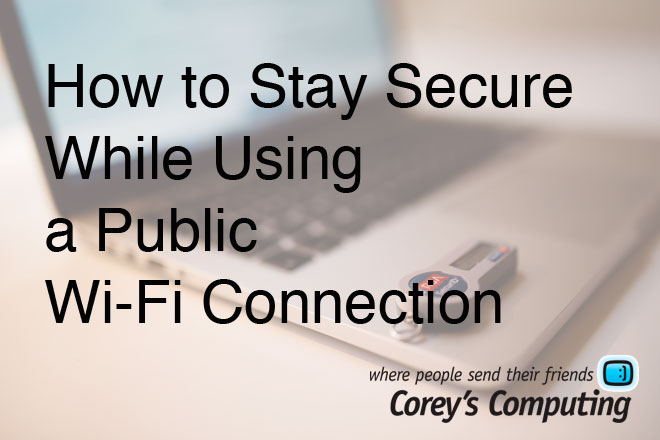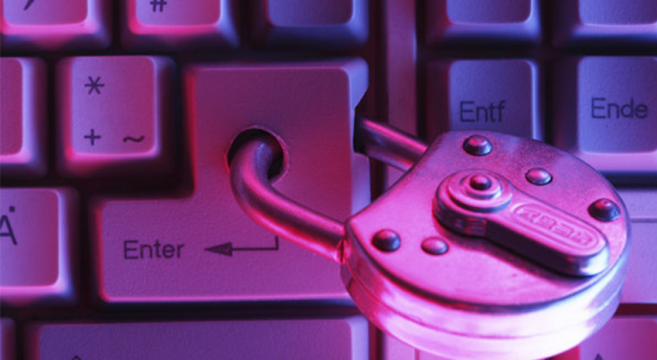How to Stay Secure While Using a Public Wi-Fi Connection
Many of us connect to the internet every single day. Sometimes it’s through our desktop PCs at work or at home, but in most cases it’s when we’re on the go we’re using laptops or our mobile phones to check our emails, scroll through social media, and stay up to date on current news and information.
This surge in mobile browsing has encouraged many internet providers to offer “hotspots” in specific areas of the city, or throughout parts of the province. But even though these hotspots may be convenient to connect to, they aren’t always secure and come with a variety of security risks that it’s important to be aware of. Sharing your personal information may feel safe and secure, but if the wifi connection isn’t secure you may be putting yourself at risk!
Below we’ll cover some basic guidelines for staying safe and secure while browsing the internet on a public wi-fi connection:

Don’t perform tasks that require your credit card
While it may be convenient to check your bank balance, order that item from Amazon, or pay your bills while grabbing a cup of coffee or waiting in line, inputting your credit card information while on an unsecured wi-fi network is never a safe idea.
Use a guest account when connecting to a public network
Windows and Apple products allow you to create a Guest account on your laptop or tablet to use while connected to a public wi-fi network. A guest account won’t be have access to the personal information which may be saved on your personal user account, and is an easy way to stay safe but still enjoy the convenience of browsing online.
Use “two factor authentication”
Two-factor authentication, which requires you to have more than just a username and password, is one of the best ways to add an extra layer of security while browsing at a public wi-fi hotspot. Generally this process also involves sending a unique code to your mobile phone, which you then enter along with your username and password. We recommend tools like Google Authenticator and the Microsoft Authenticator app for this purpose (for more information, give us a call at 204-586-7953)
Make sure your operating system and security programs are all up-to-date
Making sure that your version of Windows, OS X or Linux has been updated recently, and that your antivirus programs are equipped with the latest versions and updates can help keep spyware, malware, and hackers from infiltrating your device from a public wi-fi hotspot.
If you’re looking for more ways to keep your PC or laptop safe and secure, give us a call at 204-586-7953 or drop us a line. Don’t forget to ask about our Monthly Maintenance and Security Program and find out how our monthly service can keep you secure.
How to Stay Safe Online

In our modern world we’re always online. Whether we’re checking our emails, catching up on local blogs or international news, or scrolling through our Instagram feeds, it’s virtually impossible to live your life without an internet connection.
However, even though the internet may be an important part of our lives it’s important to stay safe while online, especially if you’re using an e-commerce website (like Amazon, Etsy, or anything that uses Shopify) or even setting up a website or blog for your business. If you aren’t already aware of some of the potential risks that you may face, make sure to check out our articles on the subject here and here.
Below are a few ways you can stay safe online:
Use better, stronger passwords
Strong passwords are the easiest way to stay safe online. It’s important to use different passwords for your email, bank, social media accounts, and any other places where you regularly log in. Be sure to mix up numbers, uppercase and lowercase letters, and special characters. Avoid using obvious number strings, like your birth day/year or anniversary, and try to mix it up whenever possible. Below is an example of what we mean:
CoR3y$c0MpuT1nG
As you can see, this reads “coreyscomputing” but is done in a way that is difficult to figure out, because letters are inconsistently uppercase and lowercase, and some have been switched out for symbols. This is an example of a strong password.
Using a secure network
Keeping your network secure is critical to staying safe online. When you’re browsing, always look for “https” in the URL name when browsing an unfamiliar website, and if you feel like the website you’re browsing isn’t secure, close the tab and don’t visit it again.
Never click links from strange emails
Sometimes emails from unknown senders will make their way into your inbox and you may be tempted to click on the links included in the body of the email. But as we discussed in our article Petya, the latest in ‘crypto-extortion’ malware, you may be putting yourself at risk! Clicking on unknown links can make you vulnerable to hackers, and this is a common method used by phishers to trick you into entering your personal information so that they can steal your information, money… or your identity.
Keep an eye on URLS
If you’re not familiar with the website you’re on, or if you aren’t sure that the website is secure, then just don’t enter in your personal information. You can easily tell if a website is secure by looking at the browser bar; if you see a little lock-shaped icon then you can rest easy, because the data is encrypted and protected.
Stay up-to-date
You don’t have to have a subscription to all the latest tech news and blogs to stay “in the know” about internet security, but taking the time to learn about upgrades and security information can go a long way towards helping you stay secure day-to-day. If this feels overwhelming, you can always call our security experts at for information – we’re always happy to help!
Avoid connecting to public Wi-Fi hotspots
It may feel tempting to connect to public wifi hotspots that don’t require a password, but these connections are rarely secure and you’re often much safer just sticking to using your data instead of connecting.
Use common sense
This should go without saying, but be very careful to never post your personal information publicly online. This means avoiding sharing credit card numbers, your birthday, personal phone number, and address in public spaces such as forums, Facebook, Twitter, blog comments, and other places online.
For more information about how we can help you stay safe online, contact us or give us a call today at 204-586-7953. Be sure to ask about our Exclusive Monthly Maintenance and Service Program and let us handle your security for you.
Is your office using old versions of Windows? You may be at risk!

According to experts interviewed by software developer and tech industry network Spiceworks, many businesses can expect to face significant challenges if they don’t boost their IT budgets.
Using data pulled from online discussions on the Spiceworks website, real-time stats from the company’s Windows-based IT management platform, and a survey of over 800 veterans of the IT industry, the company has concluded that the majority of businesses are woefully behind on updating their Windows operating systems and programs, which could lead to expensive and time-consuming issues down the line. One of the examples cited by the survey is the variety of security risks associated with relying on “dead” software such as Windows Server 2003 and Windows XP (which more than 60% of companies polled currently still use).
An Issue for Small Businesses
Researchers stated that while management at most businesses is focused on keeping costs low, they are ignoring the looming IT budget which will be required to deal with issues relating to supporting and troubleshooting outdated software and programs.
This is commonplace for small businesses, especially, and was reflected in their findings, which broke down the following ways:
- Businesses with fewer than 20 employees: 16%
- Businesses with between 50 – 99 employees: 20%
- Businesses with between 100 – 249 employees: 24%
- Enterprise businesses with over 100 employees: less than 8%
Key Findings:
Below are a few important takeaways from the survey – do any of these sound familiar? If so, it may be time to rethink your IT strategy:
Despite increasing revenue, IT budgets remain low.
According to Spiceworks, only 38% percent of North American companies are expecting to increase their IT budget in 2016, with larger companies being the most likely and smaller businesses being much less likely.
IT departments aren’t expected to grow.
This means that your IT professionals will be doing more with less, decreasing their ability to do their jobs effectively. Approximately 62% of companies surveyed responded that “IT security wasn’t a top priority in 2016”, meaning that many companies are at risk for viruses, hackers, malware, and more, and their IT staff will be stretched thin trying to handle it.
Tech end-of-life is expected to influence investment in IT.
So what does get companies thinking about investing in their IT? According to Spiceworks technology end-of-life (that is, software or programs which are actively being phased out and no longer supported by companies like Microsoft) topped the list of reasons to invest in IT in 2016.
“This speaks to the motto of many companies: ‘If it ain’t broke, don’t fix it,’” states the research.
Why does this matter to your business?
As software becomes less supported it becomes more prone to issues and more open for attacks and infiltration by viruses and malware, which means that even though your Windows XP PC may appear to be in perfect working condition, it may actually be a liability to your business. It’s important to continue to update your hardware with the latest updates in operating systems, virus protection, and other important upgrades.
At Corey’s Computing our team of PC experts are happy to help your business stay up-to-date and keep your privacy secure. Contact us or call the store at204-586-7953 for more information about how we can help.

